How is the life of a person who has travelled India on foot, cycle, and vehicle
Travelling India by any means would be incredibly diverse and rewarding. The journey provides a unique opportunity to experience the vast cultural, geographical, and historical diversity of India. The person travelling would have interacted with people from different regions, religions, and backgrounds, gaining insights into the rich tapestry of Indian society. While travelling by foot or by cycle provides a more intimate connection with the surroundings, enabling one to appreciate the smaller details and observe the local way of life up close, using vehicles and other transport systems would provide a faster and more efficient mode of travel, offering the chance to cover greater distances and explore remote areas that might be challenging to reach by foot or cycle alone.
During my all-India cycle tour, I had the opportunity to meet Dipak Belwalkar, a seasoned traveler who has extensively explored the country. Interacting with him revealed the extraordinary life he has led. Despite being 53 years old, he continues to embark on journeys, devoting nearly half of the year to travel. Engaging in conversation with him provided unexpected insights that broadened my perspective about why one decides to travel.
So, how is the life of an individual who has travelled India on foot, cycle, and vehicle?
Table of Contents
ToggleThe basement: commonalities with the society
Despite the unfortunate loss of his father at an early age, Dipak sir displayed remarkable resilience by leaving his education to take over his father’s jewelry business. Merely 14 years old and in 9th grade, he assumed the responsibility of running the business. As his younger brother grew older, he handed over the reins and ventured into the construction industry, which remains his primary occupation to this day. Alongside his professional pursuits, he even served as the city mayor at one point. However, recognizing the significant time commitment required for community service, he made the difficult decision to step away from it. Presently, he also manages his own small bank, further diversifying his ventures.
Remarkably, he emphasizes that his family has been supportive of his travels and often accompanies him on his journeys.
The building: a skyscraper that stands out in the society
While Dipak Sir may superficially appear as a businessman to society, his accomplishments set him apart from the rest. It would take most individuals multiple lifetimes to explore India to the extent he has. Spending a couple of hours attentively listening to him recount his travel tales, complete with precise details and recollection of dates and times, was truly captivating. Attempting to list every single one of his journeys would be a meticulous task. Instead, I will highlight some of the noteworthy experiences from his extensive travels.
Dipak Sir, a Dharmic individual, has extensively visited renowned temples across India. His favorite destination is Vaishnodevi, which he has visited an impressive 47 times. This place holds a unique sense of tranquility and peace for him. On four occasions, he cycled to Vaishnodevi, while once he undertook the journey on foot. During the COVID pandemic, when the virus was spreading rapidly in the country, Dipak Sir walked a distance of 2100 km from his hometown of Karad, Maharashtra to Vaishnodevi in 38 days. He finds great enjoyment in cycling trips, appreciating the effort and challenges they entail. Notable cycling journeys include Karad to Kanyakumari (twice), Karad to Ladakh (twice), and Karad to Nepal. One of his favorite experiences was the Narmada Parikrama, a 2600 km cycle ride that he also completed on foot. In total, Dipak Sir has cycled over 25,000 km in his lifetime.
Dipak Sir is also an avid bike rider, and he has explored the entire country on two wheels. His most remarkable journey was a ride across the “Seven Sisters” of Northeast India, covering a distance of approximately 14,500 km in just 47 days. Additionally, he has completed all five Kailash Yatras on his bike, with multiple repetitions. He has undertaken the Kailas Mansarovar Yatra twice, the Shrikhand Kailash, Aadhi Kailash, and Kinnar Kailash Yatras each five times. Furthermore, Dipak Sir has accomplished the Amarnath Yatra six times, the Chardham Yatra four times (including one time on foot), the Mani Mahesh Yatra eleven times, and the Girnar Parvat Yatra sixteen times.
In addition to the mentioned achievements, Dipak Sir has undertaken numerous perilous treks and rides across Himachal Pradesh and Uttarakhand. Particularly in 2005, when he used to bike to Ladakh, the roads were not as well-maintained as they are today. He nostalgically recounted how him and his friend would embark on the ride on a 100cc Splendor bike. Nowadays, such a feat would make headlines, even with the improved road conditions. These individuals were the true pioneers of bike riding. Presently, Dipak Sir owns a Renegade Commando bike, which he utilizes for his journeys to these regions.
Dipak sir’s achievements became so well noticed in the city that, recently, when he commenced his Bara Jyotirling ride, the city’s Governor, Srinivas Patil, inaugurated the event and made the decision to name an institute after Dipak Sir. The registration process for the institute is currently underway.
During my continued interaction with Dipak Sir, his travel stories remained a prominent topic. Just a few months ago, he embarked on the Duttatreya Yatra, and currently, he is in the midst of planning a ride to Spiti Valley, as well as an Everest Basecamp trek scheduled for September. His passion for exploration and adventure seems to be unwavering.
Amidst his travels, Dipak Sir has formed a strong group of 22 members who accompany him on his adventures. Interestingly, what stood out to me was that he hasn’t undertaken any solo journeys. He always ensures that he has company during his expeditions. The Mani Mahesh trek is the only travel experience where he ventured alone, as a friend left midway. However, for trips such as Vaishno Devi and Leh Ladakh, he cycled with just one other person. For all other journeys, he has made it a point to travel with a group.
Furthermore, Dipak Sir prioritizes including his family members in his travels. He arranges flight, train, or bus tickets for them to reach the destinations where he plans to walk, cycle, or bike. He values the presence of his loved ones throughout his remarkable journeys.
The mindset: why travel India by walk, cycle, bike, or other means of transport so extensively?
During my conversation with Dipak Sir, I discovered that he had a genuine fondness for traveling in groups. It was evident that his adventures were not solely driven by personal motives. Intrigued by his preference for group travel, I decided to delve deeper into his mindset and motivations behind embarking on numerous tours across the country accompanied by a large group of people.
To gain further insight, I posed personal questions that I hadn’t anticipated receiving such profound answers from a seasoned traveler. It was remarkable to discover that beneath the surface of a person who had endured the hardships of extensive travel, there resided a compassionate individual with a genuine love and care for people. Dipak Sir’s heart was filled with warmth and empathy, traits that transcended his adventurous spirit.
Justifications
When asked about his extensive travels, Dipak Sir responded with a selfless sentiment: “I want others to see the happiness I see when I travel. When they feel happy, I feel happy too.” This statement revealed his true intentions and spoke volumes about his character. He shared an example of organizing a trip to Vaishnodevi for 350 people, charging only 6400 rupees per person. His goal was to provide an opportunity for parents and older individuals who had not traveled much, including those who had never been on a flight. It was evident that his actions were driven by a desire to help others appreciate the beauty of travel, rather than personal gain.
Furthermore, Dipak Sir expressed his love for organizing events. He arranged a 19-day foreign tour for 52 people, visiting seven nations including Sri Lanka, Thailand, Singapore, Malaysia, Hong Kong, Indonesia, and Cambodia, at a cost of just 50,000 rupees per person. He even went the extra mile by assisting those who did not have passports, ensuring they were able to join the trip.
In addition to his selflessness, Dipak Sir demonstrated great humility. While speaking with him, his friend revealed that Dipak Sir had shared only a fraction of his achievements. His friend highlighted an instance where Dipak Sir took 79 people from 28 families on the Mani Mahesh and Pancha Kailash Yatra, sponsoring the expenses for non-working individuals within the group. However, Dipak Sir modestly brushed off the story and continued discussing other subjects without seeking self-praise. His humility added another layer to his remarkable character.
Validations
Dipak Sir shared that he derives a sense of satisfaction when he sees the happiness of those around him. He mentioned that this inclination towards bringing happiness to others has been a part of his nature since childhood. His primary desire was to witness the perpetual happiness of the people in his surroundings. Additionally, Dipak Sir acknowledged that he may have inherited this trait from his father
Complaints
When questioned about his biggest complaints in life, Dipak Sir confidently stated that he has accomplished everything he set out to do. He questioned the need for complaints, highlighting his contentment with life. Moreover, he emphasized that his extensive journeys have imparted invaluable lessons about life. Through travel, he has learned to accept and adapt to various situations that arise, both in the mind and the body. Dipak Sir expressed that his mind and body have now reached a state of acceptance towards whatever happens around him. This resilience and acceptance have become significant lessons he has gained from decades of traveling.
Materialism
Although I had a strong intuition that Dipak Sir would continue traveling if he received a large sum of money, I still posed the question to him. As expected, Dipak Sir affirmed his passion for exploration and generosity towards others. He shared that if given unlimited financial resources, he would take all his friends, especially those who cannot afford to travel, with him on his journeys. His goal would be to provide countless individuals who have never had the chance to travel in their lives with the opportunity to do so. Dipak Sir’s response further exemplifies his selfless nature and his desire to share the joy of travel with others.
Meeting Dipak Sir was an absolute delight. Among all the characters I have encountered on my journey, he stood out as one of the most humble individuals. Seizing the moment, I took the opportunity to pose an additional question to him. I asked Dipak Sir what message he would like to share with the world. In response, he humbly mentioned that despite not having received formal education, being 53 years old, weighing approximately 100 kilograms, and managing his own business, nothing has hindered his passion for travel. His resounding message was that everyone should incorporate travel into their lives. He emphasized the ease with which people tend to complain about everything, and he urged others not to make excuses when it comes to embarking on transformative journeys. Dipak Sir’s perspective serves as a poignant reminder that traveling is an essential part of life and should be embraced with open arms, irrespective of one’s circumstances.
What are your excuses for not travelling? Comment below and let me know. If you enjoyed reading this article, kindly head to the homepage and subscribe to my newsletters for more such articles.
I am a 31 year young PhD graduate who has decided to travel the length and breadth of India on my cycle, to document the journey of meeting a vast array of people. In my journey, I intend to understand the characteristic features of the people of this nation and categorize them based on their demographics, age, profession, gender, traditions, and cultural differences.
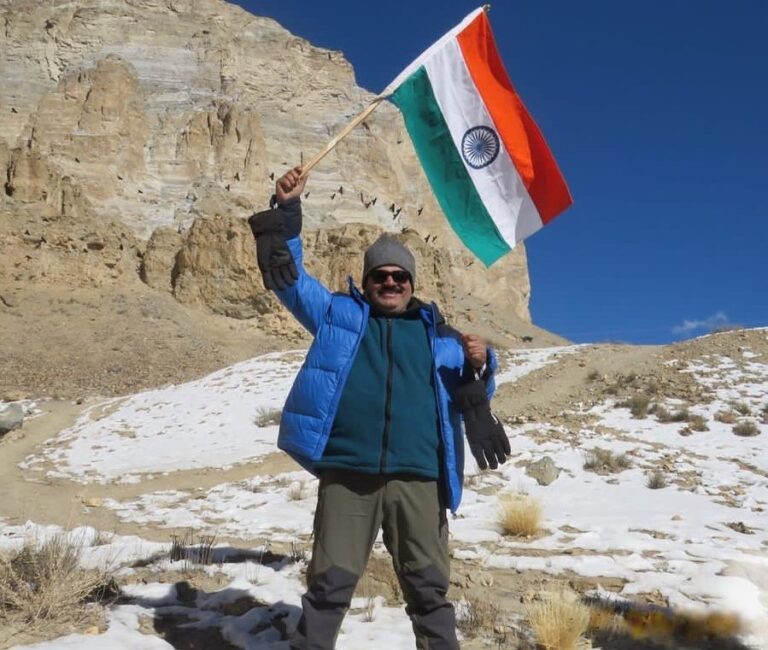
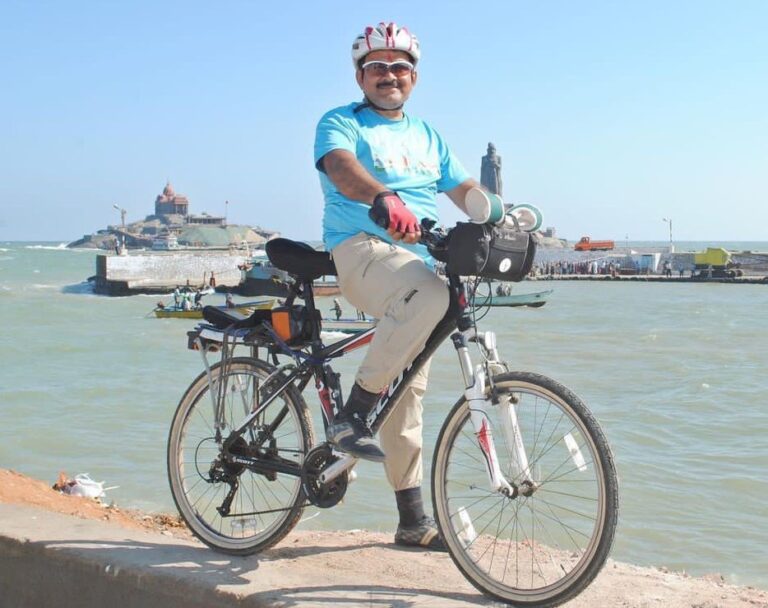
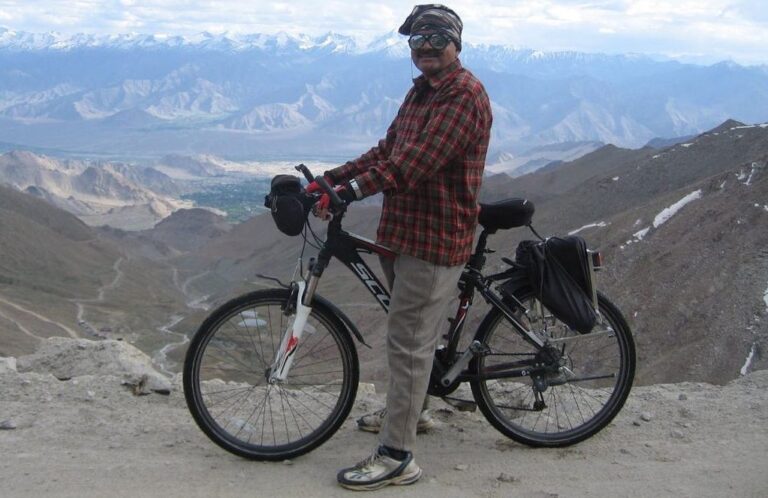
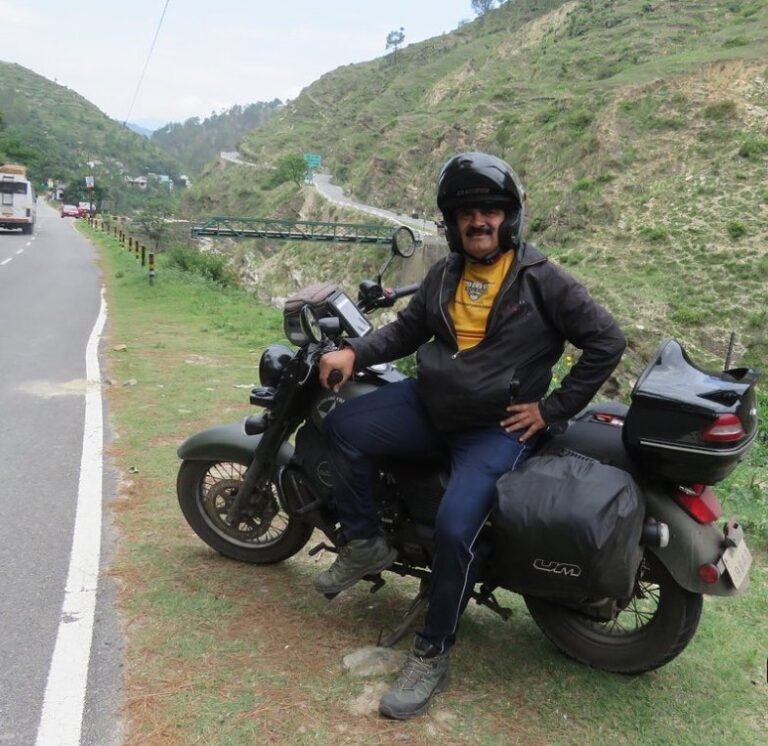
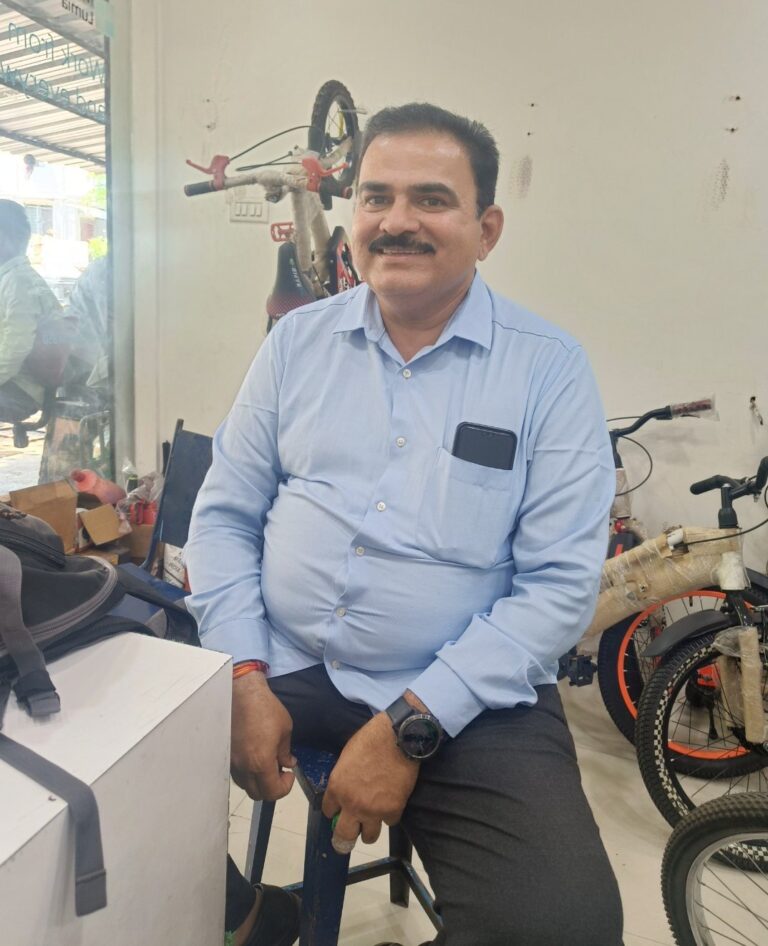
I can see you really enjoyed meeting Mr.Dipak. it reflects in your writing in this article all over. Great piece of writing. I have one request, whenever you meet such individuals who have such a ‘outward’ life, can you ask them how they manage the finances and family life to accommodate such time and money demanding aspects.